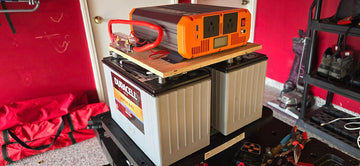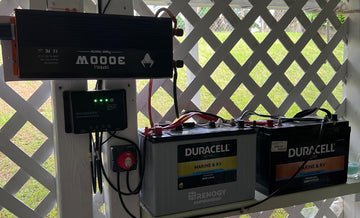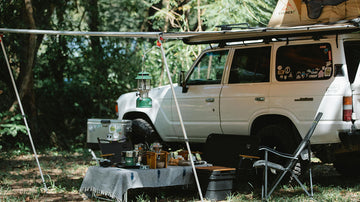Have you ever been confused between an inverter and a generator when a sudden power outage leaves your home in the dark, or when you need to recharge your devices during an outdoor adventure? While both devices provide power, they actually function and work very differently, like “twins” in the world of electricity - similar on the outside, but very different on the inside. In this article, we'll provide a comprehensive overview of how inverters and generators work, their advantages and disadvantages, as well as their application scenarios, to help you make an informed purchasing decision.
What is an Inverter
An inverter is a device that converts direct current (DC) from batteries or photovoltaic panels into alternating current (AC) for household appliances through power electronics.
Its operating principle is based on electronic switching technology, which allows for efficient power conversion. Types of inverters include sine wave inverters, modified sine wave inverters and off-grid inverters. They are widely used in solar energy systems, UPS (uninterruptible power supply) and portable power supplies. Inverters are widely favored because they are efficient, quiet and energy saving, especially when using renewable energy sources.
More in detail: What is an Inverter: The Complete Guide
Advantages and Disadvantages of Inverters

Advantages
Quiet operation: inverters produce little or no noise during operation, making them suitable for residential environments.
High energy efficiency: Many modern inverters have high conversion efficiencies, allowing them to efficiently utilize the power stored in batteries.
Portability: Inverters are usually small and lightweight, making them easy to carry around, especially during outdoor activities.
Disadvantages
Limited power: Inverters usually have a lower power output than generators and may not be able to meet the needs of energy-hungry equipment.
Battery-dependent: Inverters usually require an external power source (e.g., batteries) to power them, and are not suitable for long periods of stand-alone power.
Cost issues: Highly efficient inverters can be expensive, especially high power models.
What is a Generator
A generator is a device that converts mechanical energy into electrical energy.
Its principle of operation relies on electromagnetic induction, whereby an electric current is generated in a magnetic field by rotating a conductor, such as a copper wire.
Generators are mainly categorized into two types: portable generators and stationary generators, which are widely used in scenarios such as homes, construction sites and outdoor activities. Portable generators are popular for their ease of mobility, while stationary generators are usually used in situations where a steady power supply is required.

Advantages and Disadvantages of Generators
Advantages
High Power Output: generators are capable of delivering large amounts of power and are suitable for running high power consuming equipment.
Continuous power supply: generators can run continuously for as long as fuel is available, providing long-term power support for equipment.
Strong independence: not dependent on external power sources, they can be used anywhere, especially in power outages or remote areas.
Disadvantages
Noisy: traditional generators are noisy during operation, which may have an impact on the environment.
Fuel requirement: requires constant refueling, which increases the cost of use and maintenance.
Complicated maintenance: generators have high maintenance requirements and need regular servicing to ensure they work properly.
What is the Difference Between an Inverter and a Generator
Understanding the differences between inverters and generators is crucial when choosing the right power equipment for your needs. Although both devices provide electricity, their operating principles, power output, portability, maintenance requirements, and other characteristics differ significantly. The following table summarizes key comparison information:
| Characteristics | Inverter | Generator |
| Power Source | Dependent on batteries, solar panels or DC power supply | Fuel (e.g., gasoline, diesel) |
| Power Output | Suitable for small devices with low power output | High output power for large appliances and tools |
| Portability | Small size and light weight, easy to carry | Usually heavier and larger, less portable |
| Operating Noise | Almost no noise | Higher noise level |
| Safeguard | Simple to maintain, mainly by keeping it clean and dry | Requires regular maintenance, including oil and air filter changes |
| Running Time | Usage time limited by battery power | As long as there's fuel to keep it running. |
| Applicable Scenarios | Home, outdoor activities, solar systems | Outage backup, construction site, remote area power supply |
| Costs | Lower initial purchase cost and lower long-term operating costs | High initial cost and high long-term fuel and maintenance costs |
| Efficiencies | High conversion efficiency, up to 90% or more for good models | Generally low efficiency, usually 25-30% |
| Environmental Impact | Environmentally friendly, with virtually no carbon emissions when using renewable energy sources | Burning fossil fuels releases greenhouse gases |
| Start-up Time | Almost instantaneous power supply | Start-up time, including refueling and engine start |
| Safety | Low heat during operation, no risk of fuel leakage | Risk of carbon monoxide poisoning, use in a well-ventilated area |
| Voltage & Frequency | Provides stabilized voltage and frequency for sensitive equipment | Voltage and frequency may fluctuate, regulator required |
Inverters vs. Generators
Portability and operating noise: inverters are suitable for outdoor use because they are small and lightweight, but generators, while large and heavy, provide more powerful power.
Maintenance and uptime: Inverters are relatively easy to maintain and are limited by battery power, while generators require regular maintenance to ensure proper operation.
Cost, Efficiency and Environmental Impact: Inverters are generally less expensive over the long term, while generators have a high initial investment and high operating costs. Inverters are significantly more environmentally friendly.
Start-up time and load handling: Inverters start quickly and are suitable for small loads, whereas generators are slower to start but can support high power equipment.
Safety and voltage stability: Inverters are safer, with no risk of fuel leakage, and provide stable voltage;
Scenarios for Inverters and Generators
Generators are more suitable for scenarios requiring instantaneous high power or short-term power supply:
- High power demand: such as construction sites, agricultural irrigation or outdoor performances that require simultaneous start-up of energy-consuming equipment (e.g., welders, stage lighting), conventional generators can quickly provide power in the range of several kilowatts to megawatts.
- Short-term use: Suitable for temporary operations such as geological exploration, movie shooting, etc. Portable gasoline/diesel models can be deployed quickly, but need to pay attention to noise (about 70dB) and exhaust emissions.
- Extreme emergency use: as a backup power source for home PV systems, to safeguard basic electricity consumption during continuous rainy days or breakdowns.
The inverter is more suitable for scenarios pursuing environmental protection, silence or long-term power supply:
- Clean energy system: with PV panels or Li-ion batteries, to enhance the power generation efficiency through MPPT technology, and pure sine wave output to protect precision electrical appliances (e.g., smart TVs, inverter air conditioners).
- Quality of life scenarios: when camping, caravanning or family emergency, the combination of inverter + battery can realize noiseless and zero-emission power supply to ensure the stable operation of equipment such as coffee machines and projectors.
- Special environment adaptation: space-constrained scenarios such as ships, communication base stations, etc. High-frequency inverters are small in size and high in efficiency, adapting to the needs of compact installation.
Hybrid system (generator + inverter) suitable for complex needs:
-
All-weather protection: such as mini-grid communities or harsh climate areas, the combination of PV + inverter + generator can intelligently switch power supply modes, using clean energy on sunny days, and activating the generator to fill in during cloudy and rainy days or at night.
- Balancing cost and performance: Although the initial investment is high, the long-term operating cost is low, which is suitable for users who pursue environmental protection and need power redundancy.
Suggestions for selection:
Family emergency: prioritize PV + inverter system, with a small generator to cope with extreme situations.
Outdoor work: choose silent diesel generator + mobile power truck, taking into account the power and flexibility.
Long-term off-grid: configure a hybrid system to optimize energy distribution through the inverter, with the generator as a guarantor and the battery balancing day and night power consumption. Generators need to be used in well-ventilated places to prevent poisoning.
RV Inverter or RV Generator, Which is Better
Choosing an RV inverter or RV generator depends on the specific needs of the usage scenario. If you spend a lot of time camping or in the wilderness and only need to power small electronic devices, an inverter may be the better choice; it's quiet and portable. However, if you need power for an extended period of time, such as to power an air conditioner or microwave, the higher power output of a generator may be more suitable.
Best Inverter Recommendations for Camping
When going on a camping trip, it is crucial to ensure that you have a reliable source of power to charge and power your devices. Choosing the right inverter will not only secure your power needs while you are outdoors, but also make your camping experience more comfortable. The following recommended inverters all have camping-friendly features, including portability, power output and safety, to help you stay powered up in nature.
Topbull 3000w pure sine wave inverter

Power output: extremely low no-load loss and energy saving, stable output of 3000W, peak power up to 6000W
Features: powerful power output, suitable for running a wide range of appliances, such as small fridge, microwave oven and so on.
Compatibility: Compatible with all types of 12V batteries to meet diverse power needs.
Portability: compact size, perfect for car and camping use.
Safety: 7 built-in protection mechanisms including overload, overvoltage, undervoltage, high temperature, short circuit, leakage and reverse polarity protection.
FAQs about Inverter and Generator
What is the difference between a generator, inverter and UPS?
Generator: A fuel-powered device that provides a high power output and is suitable for long periods of time.
Inverter: Converts direct current to alternating current, requires battery power and is suitable for household equipment and small applications.
UPS : Provides immediate power in the event of a power outage, mainly used to protect computers and sensitive equipment, usually less powerful than a generator.
Inverter or generator, which is best for home use?
For home use, an inverter is usually a better choice, especially if only small appliances need to be powered. Inverters are quiet, energy efficient, and adequate for most household equipment. A generator is better when the home needs backup power to support high power consumption devices.
Which is better inverter or generator?
Choosing an inverter or generator depends on your specific needs. If you need a quiet, portable and low-power solution, an inverter is the better choice. If you need a continuous, high-power supply, a generator is more advantageous.
Can an inverter replace a generator?
In some cases, an inverter can replace a generator, especially for low-power devices. In some cases, an inverter can replace a generator, especially for low-power devices. However, if you need to meet the needs of high-power devices or for long periods of time, a generator will be a more reliable solution.
Can a 3000W inverter run a fridge?
In general, a 3000W inverter will run most household fridges, especially those models that have low power after startup. However, it is important to verify the start-up power of the fridge and make sure the inverter is rated for it.
Will a 4000 watt generator run a house?
A 4000 watt generator can provide basic power for a small house and can run some household appliances such as fridges and light fixtures. However, it will not be able to support the entire house with all appliances running at the same time for an extended period of time. Evaluating the total power needs of a house is critical to making decisions.
Conclusion
When choosing between a generator and an inverter, it is important to understand their respective advantages, disadvantages and applications. Depending on your usage needs and budget, you can choose the device that best suits your needs to ensure a reliable supply of electricity in any situation. Whether you choose an inverter or a generator, knowing about these products can help you make a smarter investment and ensure that the power needs of your daily life and specific needs are met.













